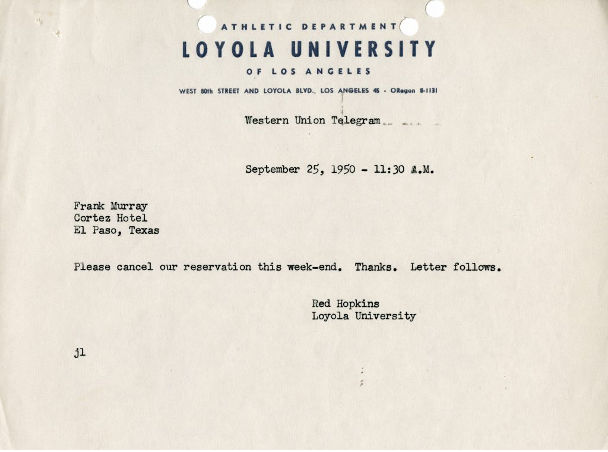
Letter from Red Hopkins to Frank Murray Manager of Hotel Cortes dated September 25th, 1950. Department of Archives and Special Collections, William H. Hannon Library, Loyola Marymount University, Los Angeles, CA.
“To heal, we must remember” our current U.S. president noted at a memorial to those who have been lost to COVID-19. In honor of Black History month, we lift up one of the stories from LMU’s past that helps us to reclaim our identity as an institution. Such stories help us stitch together our collective identity from the diverse stories that have woven us into the university we are today. Some stories, like this one, are uplifting, while others are not. This iconic story about the LMU football team of 1950, is excerpted from an article written by Brennan Campbell, a senior history major at LMU as part of a fall 2019 assignment for HIST 2910 “Telling History in Public” with Professor Elizabeth Drummond.
In 1950, then Loyola University (Loyola Marymount University following the merge with Marymount college in 1968-1973) was scheduled to play against Texas Western College in a football game. LMU had three black players and a black trainer on the team. It was not uncommon for black athletes to attend colleges in California. In 1950, black people still faced racism and de facto segregation similar to what Jackie Robinson had experienced at UCLA. But it was different from the legal racism and segregation of Texas. There were massive differences in how the state of California and the state of Texas treated black people in the 1950s. Nonetheless, a game had been scheduled between Loyola University and Texas Western. Red Hopkins was the LMU football team manager. He had the responsibility of making the accommodations and scheduling games. He was responsible for scheduling the Texas Western game and also made the hotel reservations for the team at the Hotel Cortes. Loyola University was put in a tough situation by the fact that the Hotel Cortes would not allow black players to stay there. The Hotel Cortes said they would make accommodations for the black athletes to stay elsewhere in the city but under no circumstance could stay at the hotel. In addition, there was a standing rule in the state of Texas that prohibited black athletes from playing:
The Board of Regents of the University of Texas, of which Texas Western was a member, would not budge from its longstanding rule that blacks could not play for or against football teams in its division.
Aaron Smith, “No One Left Behind,” LMU Magazine, 2017.
This rule plus the black athletes not being able to stay at the same hotel as the rest of the team did not sit well with members of Loyola’s team, athletic program, or faculty. Loyola University had to decide whether to play in this game without their black athletes and trainer being able to go. Loyola University stood by their Jesuit values when it came to defending the black players and trainer. From a Jesuit perspective, it would be unethical to allow such discrimination just to play in the game and for the success of an athletic program. It was not a simple decision, though, because if you cancel the game you lose money, and it also looks bad for your football program. The hotel was already booked for the whole team as well as airfare. The following is a direct quote from Red Hopkins to the Hotel Cortes in El Paso dated September 25,1950 weeks before the game “Please cancel our reservation this weekend. Thanks.”
By canceling the reservation, Loyola canceled the trip to El Paso. This was the first step in forfeiting the game against Texas Western. Loyola did not stand for segregation and stood up for their black athletes and trainer. According to the article from the LMU Magazine, the school lost roughly $10,000 dollars from forfeiting this game. It also was harder for Loyola to schedule games with other teams going forward. Knowing a team canceled a game within a season was unsettling to some schools. Red Hopkins had trouble getting scheduled to play games outside the state of California. All the players and coaches supported the decision, which was ultimately made by Loyola University president Charles Casassa. Loyola suffered financially and athletically from this decision, but they placed their Jesuit values above winning.
We will soon share news about an initiative that will enable us to dig deeper into our LMU history, gathering stories and images from LMU alums, representing an array of ethnically and culturally diverse backgrounds, to help us fill in the gaps of the stories we do not know. To heal, we must remember.
In the meantime, please share your six word stories with us. This week, we lift up one example of “In Six Words…” stories to help get you started:

On Fighting Racism: “I believe that we will win.”
by Stefan Bradley, Professor of African American Studies and Diversity & Inclusion Coordinator, BCLA
There are a million reasons not to be hopeful at this moment as it regards institutional America’s relationship to systemic racism; however, there is one reason to maintain hope: the unwavering commitment of Black citizens to justice and freedom. Based on our historical ability to achieve excellence “in spite of” the worst circumstances, I have faith that we will be victorious in this time of tumult. As the refrain goes: “When we fight, we win!”
OIA Buzz
- VISIT AND SHARE: With thanks to our student staff at the Academic Community of Excellence, a new web hub has been launched to connect students from historically underrepresented populations to supportive services and programs offered at LMU. Visit Supporting Students from Historically Underrepresented Populations.
- VIEW AND LEARN: Jennifer Belichesky-Larson, associate vice provost for strategic initiatives, and chair of the DEI Data Working Group, presents on the importance of data in equity work.
- SYSTEMIC ANALYSIS: Join us for a workshop or report out session this month:
- In the Systemic Analysis Consultation Workshops, attendees discuss the main diversity, equity and inclusion – DEI – priorities for their areas, anticipate obstacles and questions, and brainstorm ways that their units can begin to restructure and improve their services to students, staff, and faculty.
- In the bi-weekly Systemic Analysis Report Out sessions, two units present on their progress toward strengthening DEI practices and establishing anti-racist systems within their sectors. These sessions have been beneficial to faculty and staff who are looking to begin their systemic analysis process or continue in their own equity-minded work to get ideas and learn from other areas. Students are also welcome to join these sessions and participate in the Q&A. Previous sessions are available to view on our Systemic Analysis page, which also includes a copy of each unit’s presentation slides.



